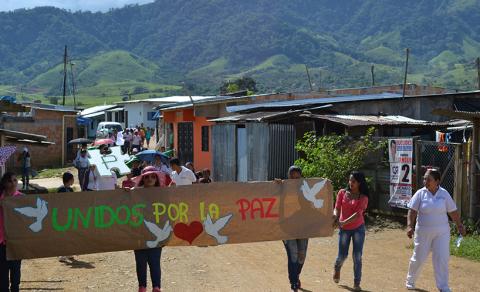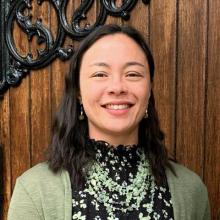UChicago Postdoctoral Scholar wins prestigious seven-year grant from UK government
By Anjali Anand
In January 2017, it was announced that members of the Revolutionary Armed Forces of Colombia (FARC) would demobilize and disarm as part of an extended peace process meant to bring Colombia’s infamous five decades-long civil war to an end. While the news was greeted with relief and hope across the world, many social scientists also wanted to know where the ex-combatants would go and how they would be reintegrated into civilian society safely and productively.
Erin McFee, a Postdoctoral Teaching Fellow in the Social Sciences and now a Future Leaders Fellow at the Latin American and Caribbean Centre at the London School of Economics, will spend the next seven years investigating those questions. McFee has been awarded the prestigious Future Leaders Fellowship (FLF) by the United Kingdom Research and Innovation Fund (UKRIF), which will fund her and her collaborators over the course of the project.
McFee’s proposed project builds on her prior experience as a researcher in Colombia, where she has conducted ten years of field work on FARC’s ex-combatants, focusing in particular on their daily lives and the personal factors that lead them to lay down arms.
McFee has been awarded over £1 million to support her research initiative entitled Trust after Betrayal: Global Development Interventions in Contexts of Organized Violence. Through the FLF award, she will join a cohort of 101 worldwide whose projects will grapple with major challenges ranging from cancer treatment to space travel. This group of FLF awardees will be based at UK universities and businesses and will be supported through a total investment of £109 million.
McFee earned her PhD in Comparative Human Development from the University of Chicago in June 2019. As she expands the scope of her investigation into criminal combatant re-integration, she will also be working with men leaving cartels in Sinaloa, Mexico, where she conducted preliminary fieldwork in the summer of 2019, and youth leaving gangs, known as the maras, in El Salvador. These three sets of ex-combatants are often compared in literatures on political violence, but as McFee points out, they differ in key social characteristics that might matter for reintegration.
“These individuals tend to be in the later portion of their adult lives, usually 40 and over,” McFee says about the men and women she spoke to in Colombia. “In Mexico, I’ll be working with younger men, ranging in age from about sixteen years to thirty years. And in El Salvador, I’ll be working with youth coming out of detention centers for children.” Her research design intentionally looks at these three different age groups to trace the evolution of ex-combatants over the life course and takes into account the familial and gender dynamics that play a role in shaping ex-combatants’ daily lives.
“The integration of the life course perspective in addition to the anthropological background I am bringing to bear on both the research design as well as the conduct of field research is one of the great benefits of comparative human development. Furthermore, it has helped me develop my ability to communicate across disciplines and speak to audiences across sectors,” she explains.
McFee, who also holds an MBA from the Simmons College School of Management, believes that her previous experience as a leader in both private sector work as well as a researcher in business and anthropology have given her a unique perspective on how to manage research teams and lead fieldwork.
“I believe my background in business contributed significantly to winning this award,” she reflects. She emphasizes that her research background spans both traditional anthropological topics as well as business topics. “I was fortunate to have already conducted research at Harvard Business School. So, the study design itself draws equally from the research that I have done as an anthropologist as well as my experience with organizational studies.”
Going forward, McFee will be managing multinational teams of researchers while collaborating with experts across international government, policy, and private sectors in order to carry out her proposed research. Her project brings together representatives and officials from six different countries and thirteen separate organizations, all of whom had to write in support of her work when she applied to the FLF.
“When it comes to mobilizing project collaborators, it has been critical to build and maintain a very active network across a variety of sectors to make sure that my research directly contributes to the policy decisions that affect the lives of the people with whom I work,” McFee says. Her network, she notes, are people whose goals for research and social impact align with her own, which has allowed for deep and sustained engagement over the years. For others who aspire to have tangible, public impact, she emphasizes that it is important to think critically about how researchers move through the world and who they support as they conduct fieldwork and bring their findings to interested audiences.
Over the next seven years, McFee will rotate between Colombia, Mexico, and El Salvador herself while also maintaining quarterly remote check-ins with her research teams. She aims to build connections between her various country teams so that they may use each other as resources and sustain conversations over the course of the project, with or without her coordination or intervention. Meanwhile, she also hopes to use her time in London to disseminate her teams’ findings through public forums, speaker events, articles, and conversations online and through podcasts.
McFee hopes that her work as a Future Leaders Fellow will help her lay the foundations for establishing her own research institute in the future. “This is a significant step in that direction that is happening quite a lot sooner than I thought it would,” she says.
The formal announcement can be found here.
 THE UNIVERSITY OF CHICAGO
THE UNIVERSITY OF CHICAGO



